Natasha, Pierre & The Great Comet of 1812
This ”War and Peace”-inspired musical completely transforms Broadway’s Imperial Theatre.
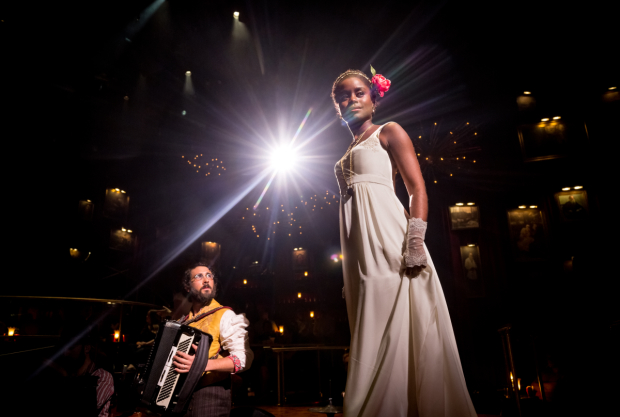
(© Chad Batka)
Would you believe that the most radically contemporary musical on Broadway this season is an adaptation of Leo Tolstoy's War and Peace? You better. With a formally daring score by Dave Malloy and a boldly immersive production by director Rachel Chavkin, Natasha, Pierre & The Great Comet of 1812 is the most exciting theatrical experience since Hamilton, a must-see for anyone who wants a sneak peek at how Broadway will look in the coming decades.
The Great Comet has gone on an incredible journey: It made its world premiere in 2012 at the tiny Ars Nova theater before transferring to Kazino, a custom-made tent that popped up in the meatpacking district and later a midtown parking lot. Now it has crashed into the Imperial Theatre on Broadway and the results couldn't be more spectacular.
One of the many ways Great Comet succeeds where similar Broadway adaptations of Russians novels have failed (I’m looking at you, Dr. Zhivago) is that it limits itself to a relatively small passage: the latter half of the second book, which protagonist Pierre (Josh Groban, making a thrilling Broadway debut) largely spends as a shut-in.
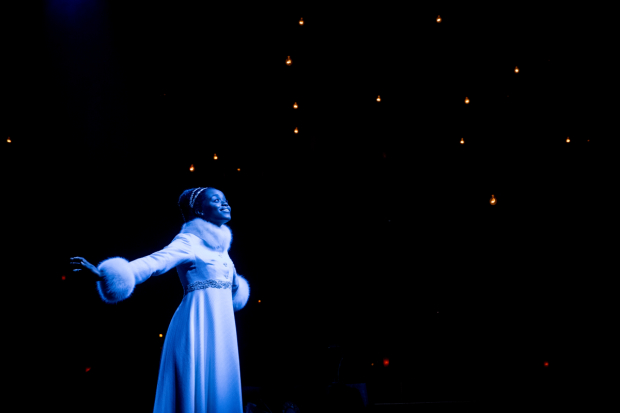
(© Chad Batka)
The story instead focuses on beautiful young Natasha (the effervescent Denée Benton). She is engaged to be married to Andrey (Nicholas Belton), who is off fighting Napoleon. Until he returns, she is staying in Moscow with her godmother, Marya D (the hilarious Grace McLean), and her cousin, Sonya (Brittain Ashford, with a soulful alto that may make you weep). Natasha is unloved by her in-laws, but is still determined to enter Moscow society. One night at the opera, she meets Anatole (Lucas Steele sporting a wedge of blond hair and an impressive rock scream), a cocky and handsome young officer intent on seducing her.
Meanwhile, Pierre silently suffers the humiliations of his promiscuous wife, Hélène (a delightfully naughty Amber Gray), and wonders if his life will amount to more than dust and ashes. It's a prophetic choice of words: These Russian aristocrats revel in decadence and intrigue as the French emperor marches ever closer to Moscow, a city that will burn to the ground before the year is out.
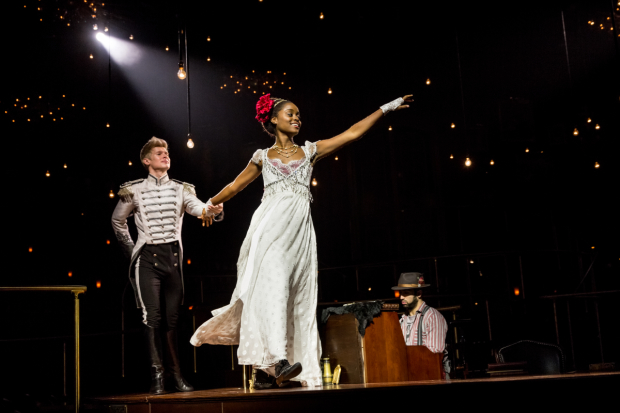
(© Chad Batka)
Malloy cleverly uses music throughout to further the story, like when Natasha and her sister-in-law (Gelsey Bell) sing the words, "constrained and strained," tonally together on the first word, but pulling apart into dissonance on the second. He smartly introduces the characters in a "Twelve Days of Christmas"-like opening number that repeats key facts ("Sonya is good, Natasha is young, and Andrey isn't here") in an effort to sear the many players into our memory.
Since the show is entirely sung through (like the Imperial’s last tenant, Les Misérables), it is safe to assume that some audience members will be lost anyway. Malloy is clear-eyed enough to recognize this, writing these lyrics in the opening number:
You are at the opera
Gonna have to study up a little bit
If you wanna keep with the plot
Cuz it's a complicated Russian novel
Everyone's got nine different names
So look it up in your program
We'd appreciate it, thanks a lot.
Malloy's sharp lyrics and tunefully experimental music make the occasional haziness of the book easy to forgive.
To further emphasize the show's operatic nature, set designer Mimi Lien and lighting designer Bradley King have installed starburst chandeliers meant to evoke those at the Met (they even theatrically retract into the rafters as the orchestra warms up). Placed all around the theater, the musicians are heroically marshaled by music director Or Matias, whose energetic conducting is a spectacle on its own.
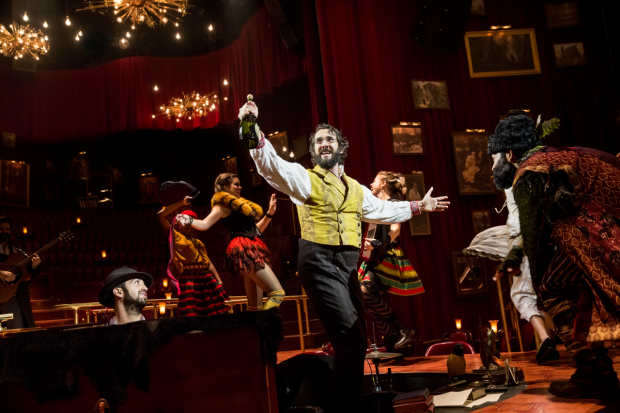
(© Chad Batka)
Most happily, this is not the case of a boundary-pushing downtown show tamed for Broadway. Chavkin and her designers have remade the 93-year-old Imperial Theatre: Audience members are placed at café tables on raised platforms positioned over what was once the stage. A runway snakes through the orchestra while two grand staircases ascend into the balcony, making the space feel like an extravagant Russian nightclub and retaining an immersive intimacy. The Great Comet is a model for how to present 21st-century theater in venues designed 100 years ago.
The staging is no less daring, with cast members acting, dancing, and playing instruments everywhere. We are all conscripted into the orchestra for the rollicking showstopper "Balaga," which features a high-flying hopak performed in the balcony (choreographer Sam Pinkleton synthesizes old and new styles while using every inch of the theater). The ensemble is game for it all, passing us flirtatious glances and more explicit notes as they dash up and down the stairs. With the confidence of runway models, they don Paloma Young's intricately detailed costumes. The ensemble commits to every moment, be it a Napoleonic battle or a Moscow rave.
Benton leads the cast with appealing innocence. Her wide-eyed naïveté has the potential to become grating, but it never does thanks to Benton's sensitivity and sincerity. We feel like we are discovering this new world along with her.
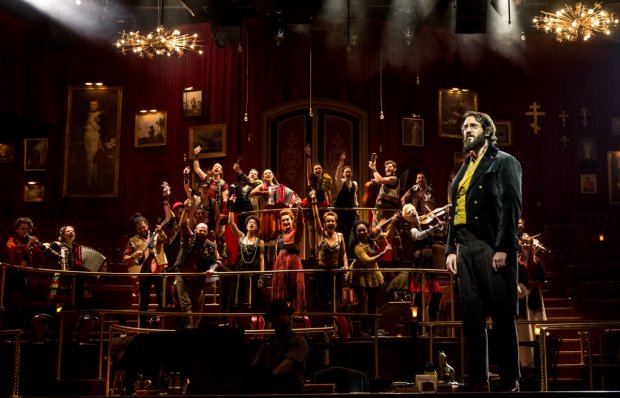
(© Chad Batka)
Groban delivers a performance that is vocally unforgettable. He portrays Pierre in broad stokes, accentuating his depression and homeliness (it helps that Young outfits him in unflattering trousers that appear pulled up over his waistcoat). This is a man so chronically starved for affection that when Natasha attempts to touch his face, he recoils like an abused cat. It's not a lesson in subtlety, but it gets the job done, allowing Groban to spirit us away with his two big solo numbers. Lest you think this is a case of park and bark, know that Groban is fully integrated into the production as an actor-musician, playing the accordion at the top of the show and regularly taking over piano from Matias. Everyone in this cast is working hard and it pays off.
The Great Comet is a night of unabashed entertainment that also manages to push the limits of what Broadway can be.









